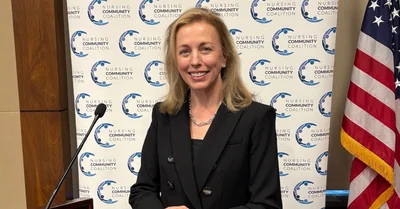The Supreme Court could issue an order or orders as soon as today on Biden administration rules on vaccine and testing rules for big companies as well as vaccine mandates for health care staffers at facilities that get Medicaid and Medicare dollars.
The court listened to arguments Friday morning from mandate opponents, led by states with Republican leaders, business groups, religious organizations and others, as well as government lawyers arguing for the policies.
Chief Justice John G. Roberts Jr. and Justices Neil M. Gorsuch, Amy Coney Barrett, Brett M. Kavanaugh and Clarence Thomas raised questions about how much authority the federal government has to impose such restrictions and if Congress has granted that authority to government agencies.
The Department of Labor’s Occupational Safety and Health Administration (OSHA) mask mandate is set to go into effect on Monday, Jan. 10, while its testing mandate will take effect on Feb. 9. OSHA has said it would not impose fines on businesses that don’t comply before late February.
Karen Harned, executive director of the National Federation of Independent Business Small Business Legal Center, told DOL Newswire the hearing seemed to bode well for opponents of the mandate. Harned said she hopes the justices either reinstate the stays on the mandate or overturn it entirely.
That could happen as soon as this weekend, she said.
“Well, we’re asking for a decision today, tomorrow, you know, whatever, before Monday for the stay,” Harned said. “I’m hopeful that we can get that. I think we may. I mean, our attorney made the best case for getting the pleadings for a declaration and information submitted on harm cause. So hopefully they will do that. So I'm hoping that we're going to see in the next few days.
“It was interesting to me," she said. "I don’t know if they would go ahead and just rule on the legality on their own. I mean, obviously that’s in their purview, or if they let those lower courts deal with the legality more before they heard the merits again, which is what I thought they would do,” she said. “But I don't know, some of the questioners maybe think they’re toying with disposing of the whole thing. I don’t know. It’ll be interesting to see, but obviously if they do the whole thing, I would not expect a decision on that immediately.”
Harned said it was a combustible hearing. The justices engaged in spirited exchanges with the lawyers during the 3-hour, 40-minute hearing.
“Well, it was what we in the business call a hot bench, that's for sure,” she said. “But it was, I think, at the end of the day, I felt like it went well. I felt like it went well for our side, that we definitely made our points, which we did in the brief, and I still think that we're right on the law, that OSHA does not have the statutory authority to do such a broad mandate on so many businesses without distinction, requiring vaccine on an emergency basis.”
Harned said the Biden administration is going against long-established precedent, something the high court noticed as well.
And that Congress never contemplated that in 1950, when they enacted the statute, as Justice John Roberts said, they enacted that when we were closer to the Spanish flu than COVID-19, Harned said.
“And, as a result, I just would like to think we made the case for why we need a stay, she said. "We need one quick. I mean, that’s our biggest thing. We just do not want this rule to take effect on Monday. It’s going to lead to people quitting their jobs. But ultimately, I am hopeful we will prevail on the law.”
There are two issues at play.
The opening argument was over companies with 100 or more employees. The Biden administration is calling for these businesses, with more than 84 million employees, to impose a mask or testing mandate. OSHA claims that will force 22 million people to be vaccinated against the coronavirus and will prevent 250,000 people from ending up in a hospital.
The second case, which would impact more than 17 million workers, calls for hospitals and other health-care facilities that receive Medicaid or Medicare funding to be vaccinated.
The White House, in announcing these rules on Nov. 4, said it this policy would “save hundreds or even thousands of lives each month.”
The 5th Circuit Court of Appeals issued a stay on the mandate, but when multiple cases were consolidated, the 6th Circuit reversed the stay on Dec. 17, 2021, reinstating the Occupational Safety and Health Administration’s mandate for the time-being. A number of business associations and state governments quickly filed an application for the Supreme Court to stay the mandate.
In its ongoing case, the National Federation of Independent Business has argued that OSHA exceeded its authority. It argues that OSHA should have used the normal notice-and-comment process instead of the “rarely used and ill-defined ‘emergency’” process. NFIB believes that “a nationwide COVID-19 vaccine and testing mandate, monitoring, and database is fundamentally a policy decision that should be left to Congress.”
Also, NFIB argues that OSHA’s mandate “will the mandate will result in unrecoverable compliance costs, lost profits, lost sales, and further exacerbate the labor shortage for small businesses.”
In a filing for the hearing, NFIB and 25 other business associations argue that allowing OSHA’s mandate to stand could give the agency “limitless” power “by allowing the agency to target dangers that exist in workplaces only because they exist in the world at large.”
The brief cites a number of cases to support this argument. They say that OSHA could target workplaces by regulating control what employee eat during the workday to control heart disease, or requiring flu or pneumonia vaccines. “Like COVID-19, these societal health problems are not tethered to occupations; they appear in the workplace only because they exist in society at large.”
In OSHA’s litigation update, the agency says it is “gratified” that the stay was lifted by the 6th Circuit.
“To provide employers with sufficient time to come into compliance, OSHA will not issue citations for noncompliance with any requirements of the ETS before Jan. 10 and will not issue citations for noncompliance with the standard’s testing requirements before Feb. 9, so long as an employer is exercising reasonable, good faith efforts to come into compliance with the standard,” the agency stated. “OSHA will work closely with the regulated community to provide compliance assistance.”
However, that could change again depending on the Supreme Court.
More than 180 members of Congress submitted an amicus brief in support of the application to stay the mandate. The brief was organized by Sen. Mike Braun (R-Ind.), and signers include House Republican Leader Kevin McCarthy (R-Calif.), House Republican Whip Steve Scalise (R-La.), Senate Republican Leader Mitch McConnell (R-Ky.), Senate Republican Whip John Thune (R-S.D.).
In their brief, the lawmakers argue that OSHA promulgated “a sweeping, nationwide vaccine mandate on businesses intrudes into an area of legislative concern far beyond the authority of the agency.” Also, they say it was done "through OSHA’s seldom-used ‘emergency temporary standard’ (ETS) provision that allows for bypass of notice and comment rulemaking under certain circumstances,” and “that OSHA exceeded its authority in enacting the ETS Mandate is not a ‘particularly hard’ question,” they argue.
They also argue that OSHA's mandate would cause lasting harm.
“Without a stay, the Business Associations’ tens of thousands of members, which collectively contribute trillions of dollars to the nation’s economy, will be irreparably harmed by the ETS,” the filing states. “They will immediately face $3 billion in compliance costs that OSHA recognized, at least $4 billion more in testing costs that OSHA ignored, workforce disruption from employees who quit or are fired — and the resulting lost sales, profits, and business reputation.”
Solicitor General Elizabeth Prelogar argues that OSHA’s action was appropriate and would save lives. “OSHA estimates that the Standard will save thousands of workers’ lives and prevent hundreds of thousands of hospitalizations over the course of just six months.”
The filing also argues that OSHA is within its authority.
“Congress has directed that OSHA ‘shall’ issue an ‘emergency temporary standard’ if the agency ‘determines (A) that employees are exposed to grave danger from exposure to substances or agents determined to be toxic or physically harmful or from new hazards, and (B) that such emergency standard is necessary to protect employees from such danger.’ The Standard falls squarely within that grant of authority.”
Harned said she does not want to offer a prognostication — “there’s no point.” But she said NFIB will pursue this issue on all legal battlegrounds.
“Well, we’re still in court in the 6th Circuit, challenging the legality of the rule,” she said. “So that challenge is not going away. We do not think they have the right to do this.”
“And it’s not just about this pandemic, it’s about future things that came up in the arguments too — what about any communicable disease going forward? I mean, so that's why, you know, we will continue to litigate regardless,” Harned said. “Well, I guess if they dispose of it and it’s in our favor, then obviously it's over … if they do everything including merits, but assuming that it’s anything short of that, the fight will continue.”
Harned has been in her current position since April 2002. Prior to that, she was an attorney at a Washington, D.C., law firm specializing in food and drug law, where she represented several small and large businesses and their respective trade associations before Congress and federal agencies.
She regularly comments on cases involving small business as they wind their way through the federal court system, and conducts seminars and webinars on issues relating to employment law, including unionization and immigration.
Harned, who served as assistant press secretary to U.S. Sen. Don Nickles of Oklahoma from 1989-93, received her B.A. from the University of Oklahoma in 1989 and her J.D. from The George Washington University National Law Center in 1995. She is admitted to practice in the District of Columbia.









